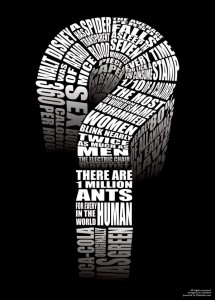Process
Donald Maass’ inspiring post last week showed us how we can tap into vivid personal memories to add new levels of delight (AKA “pixie dust”) to our storytelling. Later that week, Kathryn Craft’s wonderful post delved into how we can use setting to reinforce the emotional state of our characters. Today I’m going to look at some ways to use aspects of both of these approaches, with the goal of taking your readers to a world they’ve never seen – but you have.
Lessons from a loudmouth
Several years ago I stumbled across an indie film called Loudmouth Soup. The film is small in scope, focusing on a Hollywood dinner party attended by seven characters who come from various levels of the food chain within the film industry. Everybody has come to the party with an agenda (some hidden, some not so much), and a tense and often passive-aggressive dance slowly unfolds over drinks and dinner.
A few things make this film unusual. First, it was shot entirely in one night. Second, and probably most unusual, it had no script. (I know some writers who will hate this idea, but please, bear with me.) Instead, the director briefed the actors on their characters’ individual backstories, and then gave each character a set of goals, and then told them to basically do whatever they had to do to achieve them, while the cameras rolled. All the players were experienced Hollywood actors, so the director was calling on them to draw on their “insider” knowledge of those familiar shark-infested waters, and basically act like actors at a Hollywood dinner party.
Oh, and all while drinking heavily. The party may have been imaginary, but the drinks they served were real. So we get to watch a group of actors slowly getting drunk, playing the part of actors slowly getting drunk. Definitely a “meta” moment in filmmaking.
I enjoyed Loudmouth Soup, but I wouldn’t go so far as to call it a great movie (although I agree with much of this five-star review). I’ll admit, the unusual way the movie was made is probably its most interesting facet. If you haven’t lived in L.A. and/or been involved in the entertainment industry, much of the film might be a bit too “inside baseball” to be compelling.
But I have lived in L.A., where it seems everybody has an agenda, everybody is playing an angle, and everybody – from bank teller to studio executive – wants to be somewhere else on the food chain other than where they are right now. And that is exactly what these actors captured so well. Their knowledge of the film business allowed them to truly OWN the world in which the story was set.
For 96 minutes, those seven increasingly drunken actors whisked me back to L.A. and all its best and worst characteristics. I’ve seen few movies that evoked such a specific time and/or place so vividly – and so quickly.
So that’s what I want to look at today: how can we take our readers to a world we know intimately, and make it come to life for them? Here are a few ways – you can likely come up with even more.
Read More
In my last post, I talked about writing texts for the youngest readers: picture books. Today, I want to look at the other end of the scale of fiction for young people: writing YA, or Young Adult, fiction.
YA fiction is flourishing right now, with many of the top-selling books in that field–for adults as well as teenagers love to read YA–and publishers are actively looking for great manuscripts. What kinds of books are they looking for? From my observation, these genres seem to be ‘hot’ right now in YA fiction:
Contemporary realism: Confronting hard-hitting issues with emotion but also a light touch
Fantasy: But not vampires or shape-shifters or angels or dystopias unless these are ‘High concept’—ie a dramatic scenario that has not been tackled before or is substantially different in treatment from what’s been done before. Fantasy also should be centered more on strong development of character than too much world-building.
Historical with an adventure/mystery/spy twist.
Thrillers: Mixed genres are popular, such as thrillers crossed with science fiction, or history
Humor: Always a winner: but perhaps the hardest thing of all to write!
Don’t despair if none of those are your bag. Publishers are looking, more than anything, for what they have always looked for: surprising, well-written, gripping stories with great characters and a fresh and interesting voice. Stories that feel like there’s passion behind them: the writer’s passion.
Okay, so that’s the market. But what exactly, from a writer’s craft point of view, are the actual building blocks of great YA fiction, without which every ‘high concept’ would not work? Over the years, I’ve had many YA novels published, from historical to contemporary, realism to fantasy and romance to thriller. And over those years, I’ve come to clarify just what it is, to me, that makes a story resonate with readers of YA fiction, so I’d like to share that with you.
Read MorePhoto compliments of Flickr’s John Bell.
Today, friends, without charging you a co-pay or forcing you to read your HIPA rights, I am going to share with you the single most important words my mechanic (AKA my therapist) ever said to me.
First though, some context. Around the time of this pivotal tune-up session (circa 2008), I had two tiny children, a mental illness, and a husband who was travelling for work, often to Tel Aviv and Mexico City, Rome and Detroit. During that particular tune-up session, he was in Bangkok, probably at a spy convention or Navy SEAL training. No one believes he’s actually in software sales.
With the time change between Seattle and Bangkok, exorbitant international phone charges, and I assume much tuk-tuk riding on his part, we weren’t able to speak to each other on the phone. It was odd, having no way to reach him, something I had not experienced for as long as we had known each other. I didn’t like it, not one bit. But I realized something surprising while he was away, and sitting on my mechanic’s couch that afternoon, I shared my news.
“You know what?” I said, “I’ve always been so terrified about what I would do if something happened to my husband. But for some reason, this trip made me realize if something did happen to him, it would be awful, terrible, horrible. I mean, it would be devastating.” I took a breath. “But I would survive.”
My mechanic, a Christian-cum-Buddhist-priest, smiled in that peaceful way and nodded his shaved head. “No . . . it would be awful, terrible, horrible. And you would survive.”
I thought about that for a moment, most likely eyeing him as I always eye wise, bald Christian-cum-Buddhists. Of course he was right. I would be devastated and I would survive. Both sides of that sentence could be simultaneously true.
Read MoreThere are hundreds (possibly thousands) of essays and articles online attempting to differentiate between writers who tell stories and storytellers who write books. Many people will say that it doesn’t matter; that it’s all semantics. Which led me to wonder…. is it?
As polarising controversies go, it’s not a very big one. I mean, it doesn’t rate up there with “Pantser vs. Plotter” or “Literature vs. Genre” or “Self Pub vs. Trad. Pub” or whatever the cool kids are arguing about these days. Nonetheless, it’s a topic that comes up from time to time.
What are writers and storytellers?
Chances are, when you read the title of this essay, one of those terms resonated with you. Maybe you consider yourself a writer. Maybe you consider yourself a storyteller. Maybe you consider yourself both. Or neither. But before we start talking about the difference between them, what do the terms even mean?
Writer
Let’s move past the simple definition of “a writer writes” and look at what the title of writer actually means. Without going all dictionary-phile on you, let’s define a writer as someone whose purpose is to write books, poems, stories, or articles. A writer is someone for whom the art of writing is paramount — grammar, word use, punctuation, etc — and knowledge of that craft is used to record stories, be they fact or fiction, through the media of written words.
Storyteller
We can define a storyteller as someone whose purpose is to tell stories, whether they be fact or fiction, for the purpose of entertainment and/or illumination. A storyteller is someone for whom the art of storytelling is paramount — character, tension, climax, personal growth, etc. — and knowledge of that craft is used to tell stories through whatever medium will best reach their intended audience. Which, in the modern day, is often writing.
But it’s not that simple…
Read MoreImage by Stefan Chinof via DeviantArt.com
How much do you TK? That’s the question.
TK in a manuscript means “to come.” So if you’re writing a scene in a historical novel set in, say, New Jersey in 1777, and you’re missing necessary facts but don’t want to stop writing at that moment in order to find the relevant information, your draft might look like this:
Mary inclined her head toward the parlor, letting him know they were not alone. The [TK-appropriate rank soldier] hesitated, then turned and walked outside. Mary checked the pocket of her skirt again to make sure the [TK-medium for message] was still there, then followed him onto the porch.
You know where you’re heading with the story and what your characters are doing, but you haven’t yet worked out some of the details. So you drop a few TKs and keep going.
Do you TK when you write? Or does writing with TKs make you feel like you’re preparing a savory recipe like Chicken with Forty Cloves of Garlic but omitting the garlic, the wine, the herbs and anything else that contains any flavor? In which case, why bother making the recipe at all?
Read More- « Previous
- 1
- …
- 28
- 29
- 30













